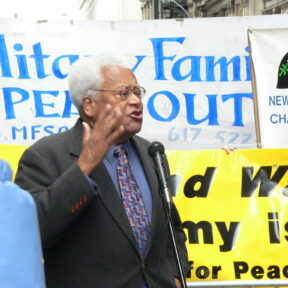
Rev. James Lawson
: Photo from Creative Commons / Author of Photo: Fellowship of ReconciliationOverview
* Methodist minister
* Former chairman of Clergy and Laity United for Economic Justice
* Advocate of open borders and a mandatory “living wage”
* Calls for the defeat of the United States in the war on terrorism
* “The status quo in America means death for people in our own streets and for the earth.”
James Lawson was born on September 22, 1928 in Uniontown, Pennsylvania. Once a prominent civil rights activist, Rev. James Lawson is the retired pastor of the Holman United Methodist Church in Los Angeles. A tireless critic of the United States, Lawson condemns economic globalization as “simply another way of continuing the economic, political, and military domination of Africa, Latin America, and Asia by the United States.” “Globalization is only a big word meaning the continuation of plantation capitalism,” he declared during the 1999 protests against the World Bank. In Lawson‘s view, those who support globalization “are part of a generation that is benefiting from our [the Western World’s] theft in Africa, South America, and Asia for 500 years.”
Such claims mirror Lawson’s convictions about the inherent wickedness of the American system, a central theme of his speeches and sermons. In one 2003 sermon, for example, Lawson said, “The status quo in America means death for people in our own streets and for the earth. And folk of goodwill, folk of faith, folk who know of the love of God in their hearts, folk who have compassion for themselves and for others, face this dilemma. Support the policies of the last twenty years in the United States, and you support the chaos in our land, and it will grow. . . . The powers that be in America are in large measure committed to racism and sexism, greed and materialism and addiction.”
In the 1940s Lawson was a member of the socialist Fellowship of Reconciliation (FOR), an organization originally established to oppose American involvement in World War I. Since the days of his FOR membership, Lawson has consistently sided with America’s enemies – in the Cold War, the Vietnam War, Angola, Cuba, and Central America. In Lawson’s telling, the Cold War ended not because of President Reagan’s policies that brought the Soviet empire to its knees, but rather as a result of anti-war marchers and “people surrounding tanks and talking with compassion to the soldiers who were set out to disperse them.”
Continuing his lifelong commitment to undermining American policy and security, today Lawson openly advocates the defeat of the United States in the war on terrorism. “If our superpower prevails,” he says, “then people will perish, war after war after war. You can name the list of those who have perished already because of the assault.” In a 2001 lecture, Lawson put it this way: “The U.S. has become the number-one enemy of peace and justice in the world today.”
Despite his opposition to globalization, Lawson is an avowed supporter of open borders – meaning the dissolution of America’s national borders, unrestricted mass immigration, and amnesty for illegal aliens already in the United States. In fact, Lawson insists that such a phenomenon as illegal immigration does not even exist. “No human being in the sight of God is illegal,” Lawson told the Los Angeles Times.
Lawson has also become a leading proponent of the “living wage” as a minimum level of compensation for workers of any kind. Numerous empirical studies have documented that raising minimum wages tends to cause a decline in the number of jobs available, especially those jobs normally filled by lower-income earners whose cause Lawson claims to champion; but Lawson is not influenced by such facts. Since 1996, he has made the living wage one of the top agenda items of Clergy and Laity United for Economic Justice (CLUE), a Los Angeles-based organization that partners leftwing religious leaders with activist labor unions; Lawson serves as CLUE’s chairman. According to Lawson, the absence of a living wage “is a derivation of slavery, which said there is an economic institution in the United States and it’s all right to have people who work and live on a subsistence basis, gaining no serious benefits except enough food to stay alive so they can stay working.”
Lawson regularly rallies his supporters with Marxist themes about an imminent revolution. “The revolution this nation needs has not yet begun,” he states. Though Lawson has been an advocate of nonviolent methods of civil disobedience throughout his career, he has occasionally hinted at more aggressive resistance to policies he rejects, suggesting that technological advances would allow for “sabotaging the whole society by ganging up on computers, phone lines, and faxes.”